Richard Lui with Kiran Kamal Prasad, JEEVIKA, Harriet Tubman Award Winner, Freedom Awards, Free the Slaves
Richard Lui can be seen every weekday from 10am to 11am on MSNBC’s Jansing and Company. In 2007, he became the first Chinese American male to anchor a weekday national newscast on CNN’s Headline News. Think he went to journalism school? Think his parents wish he were a doctor? Think his last name is actually Lui? Wrong on all counts!
Mr. Lui was kind enough to sit down with me recently to discuss his less-than-typical background and career path. Lui’s roots go back to southern China; his family’s actual surname is Wong. Why the name change? Lui’s grandfather was an undocumented immigrant known as a Paper Son (a topic Lui has done much investigative reporting on), but Lui’s father didn’t find out himself until he was 40 years old and saw the gravestone at his father’s funeral. Lui’s mother’s side includes generations of laborers who came to the States four, five, possibly six generations before Lui.
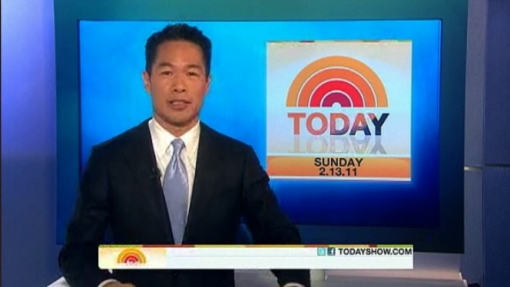
NBC Today show news anchoring
So how did Lui get to MSNBC, a far cry from his laborer predecessors? Lui grew up in San Francisco, where he “got kicked out of” magnet high school Lowell, then “barely graduated” from another high school. After graduation when he claims he “did not understand the value of education,” Lui decided against college and instead hired on at then-upstart Mrs. Fields cookies, where he worked in marketing for four years. “I did well there; I had a great time,” Lui recalls -- and honestly, how could working with cookies NOT be a great time?
Eventually Lui fell into a pattern that’s a bit more recognizable, going to City College in San Francisco, then Berkeley, followed by five years of marketing and business work that led to an MBA program at the University of Michigan. Lui and a few of his Michigan classmates came up with the idea of bank-centric payments (“Sounds really exciting, I know,” Lui deadpans as he explains this), which they launched with Citibank in Singapore.
My head spinning from all the different directions that Lui’s describing (okay, fine: I was still thinking about cookies), I still couldn’t help but wonder how the heck all this led to news anchor on MSNBC.
Lui and his business partners sold their business in Singapore, and he was ready to move to New York and take up the consulting position that was awaiting him. At this point, however, he realized that he missed the radio journalism he had done at Berkeley. There, Lui had written, anchored, and produced, working on stories like the Rodney King riots, Magic Johnson’s announcement that he was HIV positive, and Diane Feinstein’s run for senator. As he considered New York, Lui asked himself, “If I could do anything in the world, what would I do, with no regrets? And I said, I’d love to do this journalism thing that I had done a long time ago. And I’m old so I better do it now -- if I don't do it now, it's never going to happen because it's not an easy industry.”
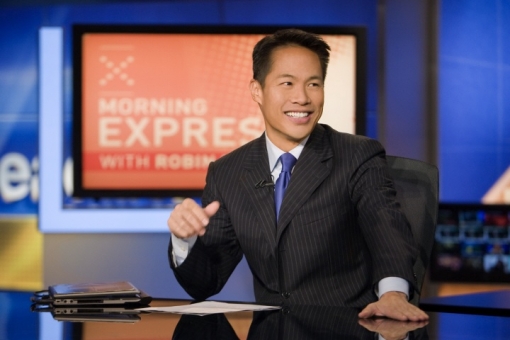
Anchoring on CNN Headline News Morning Express
Lui then decided to take a job with English language network Channel News Asia in Singapore. There was still one complication: that consulting firm waiting for him in New York? It had sponsored Lui’s MBA, so his declining their position also meant his repayment of school expenses -- in other words, Lui had to PAY to work for his first year as a professional journalist.
How did your parents feel about that?!
“So I called [my dad] and I was like, “Hey dad I'm going to take this [TV journalism] job…The first thing he did was, he laughed! He laughed and said, ‘Richard, I always knew you were a special kid. You would do things your own way’…It was always sort of touch and go [ever since high school] but [my parents] were always very supportive of that…My father, he's a reverend. So as he was growing up, I don’t know that he necessarily took the typical path for a young Chinese American…'Dad, I'm going to go to seminary.’ I'm sure his parents were like, ‘What do you mean?’”
Lui knew that moving back to the States and staying in TV would be tough. “It is odd to have anybody [come to a news network] from a network not in the United States or not come up from the affiliates into the network system.” His agent pitched him again and again to the different networks and eventually found interest at CNN. “I came in on two trips from Singapore; I'd fly in on a 25-hour flight to New York -- it was crazy. And I’d go to the audition the next day and after the fourth audition I got a job.” Lui started on cnn.com’s Pipeline, later moving to Headline News and then Morning Express, where he anchored his own show for one of the four hours of the program, “cross-pollinating” all the while between different networks so that he had the opportunity to work on all sorts of stories in all areas of the country.
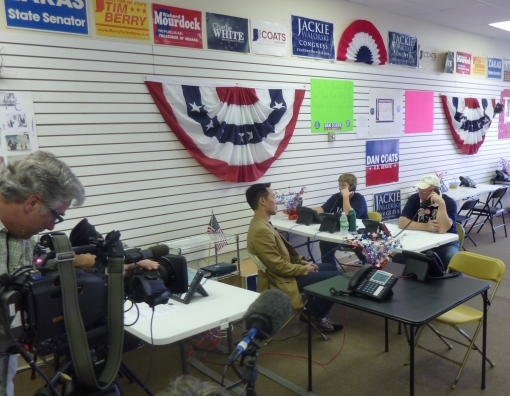
Richard Lui on campaign trail with Tea Party candidates during 2010 midterms
Lui has continued his constant search for different types of stories since moving to Jansing and Company on MSNBC in the fall of 2010. “The interest now is always diversity of activity.” Lui grows visibly excited when describing NBC’s ability to handle the complexities of diversity, both in terms of stories/news coverage and the push for a diversity of faces in front of and behind the camera. As a rhetoric major, Lui loves argument and debate: “Argument means bringing in different perspectives and coming to some new truth…diversity is important for that, it reaches a new understanding. That doesn't mean that I love arguing [as in] angrily arguing; I think there's a time for that but I think the majority [of the discussion] is reasoned logic.” NBC does have a diversity council that looks out for representation of all groups (of race, gender, nationality, etc.), and the entry level News Associates Program is particularly geared to bring in a diverse set of younger perspectives.
In case it didn’t seem like Richard Lui was busy enough, it’s important to note that he is involved in many community service activities, particularly those concerning human trafficking, homelessness, and affordable housing. Lui has even had the opportunity to bring his service interests to work with heartbreaking stories on underage sex slaves in Asia and a Habitat for Humanity story in Ghana with diplomat Kofi Annan in addition to serving on several boards dealing with homelessness (Lui is particularly concerned that 30% of those who are homeless are veterans) and affordable housing.
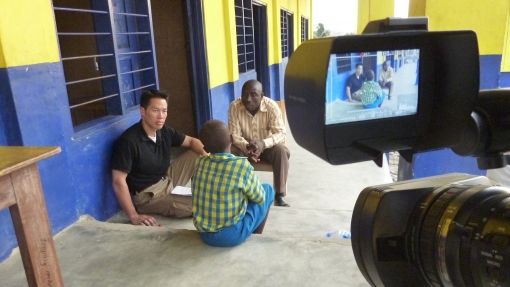
Reporting in Ghana on human trafficking, with James Kofi Annan
I almost hesitate to ask Lui what advice he has for those interested in a career in television journalism, knowing that he’s clearly a preternaturally diligent and devoted worker, and his background, schooling, and career path are all unusual in different ways. But don’t worry, I did.
“My suggestion is not very earth-shattering, unfortunately. It is to follow your passion...When you think back to previous generations, you were locked into one thing for the majority of your life…the question I always like to ask is, ‘What do you really love to do? What if [the job you prepared for] didn't happen…what would you do otherwise?...Then I say, pursue that in college. Because I'm biased. My bias is that of not being the traditional: you know, ‘I went to undergrad,’ ‘I did journalism school,’ or writing, or English…I didn't do that. And I think our job as journalists is to provide context to stories. And the way we can provide a unique context is to develop those things that make us unique and interesting. So when I say, ‘Follow your passion,’ it is to develop that which you love and by developing that which you love, you are able then to provide your perspective, your context on stories. I'm not saying that you're not going to get that at j-school, but if you come in as a, say, business undergrad or as a poetry undergrad, all of a sudden in the newsroom…you can provide the business perspective or the poetic perspective to the story and there for you're able to provide a different context…at the same time that you are pursuing something that you love…You might as well try to have as much fun as you can along the way.”
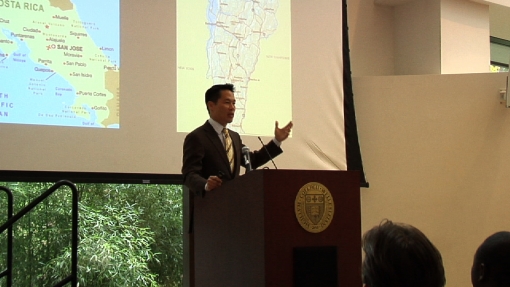
Speaking on Human Trafficking at Wellesley College
Inspiring words! As I packed up my notebook and my old school tape recorder (as in cassette tape, it’s true) feeling newly stirred and reinvigorated, I responded to my interviewee’s kind inquiry about what I “usually” write about for Hyphen. Slightly abashed, I described the frivolous fare I usually cover for the TV column: reality TV.
“I love reality TV, though! Jersey Shore is my favorite and Real World 2 in San Francisco, I had applied for—“
Really?!
“Yes I did. And they asked me for a tape back then and I was like, ‘I don’t know how to put together a tape.’ I was working and going to school at the same time at Berkeley. But I love Real World; it’s awesome. It was in my town but I decided it wasn't right for me. I couldn't put together tape, basically."
You should re-try!
“Well The Apprentice was also one -- season 2 was one that I applied for.”
He could have been a whole different kind of TV personality…
Hey, there’s still plenty of time. Who knows what new twists Richard Lui will take!
Thanks so much to Richard Lui for taking the time to chat, and to Weesie Viera for setting up the interview. Check out Richard Lui’s (unofficial) website here, and watch a recent clip from Jansing and Company right here.






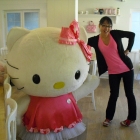


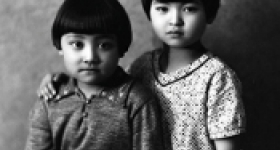
Comments